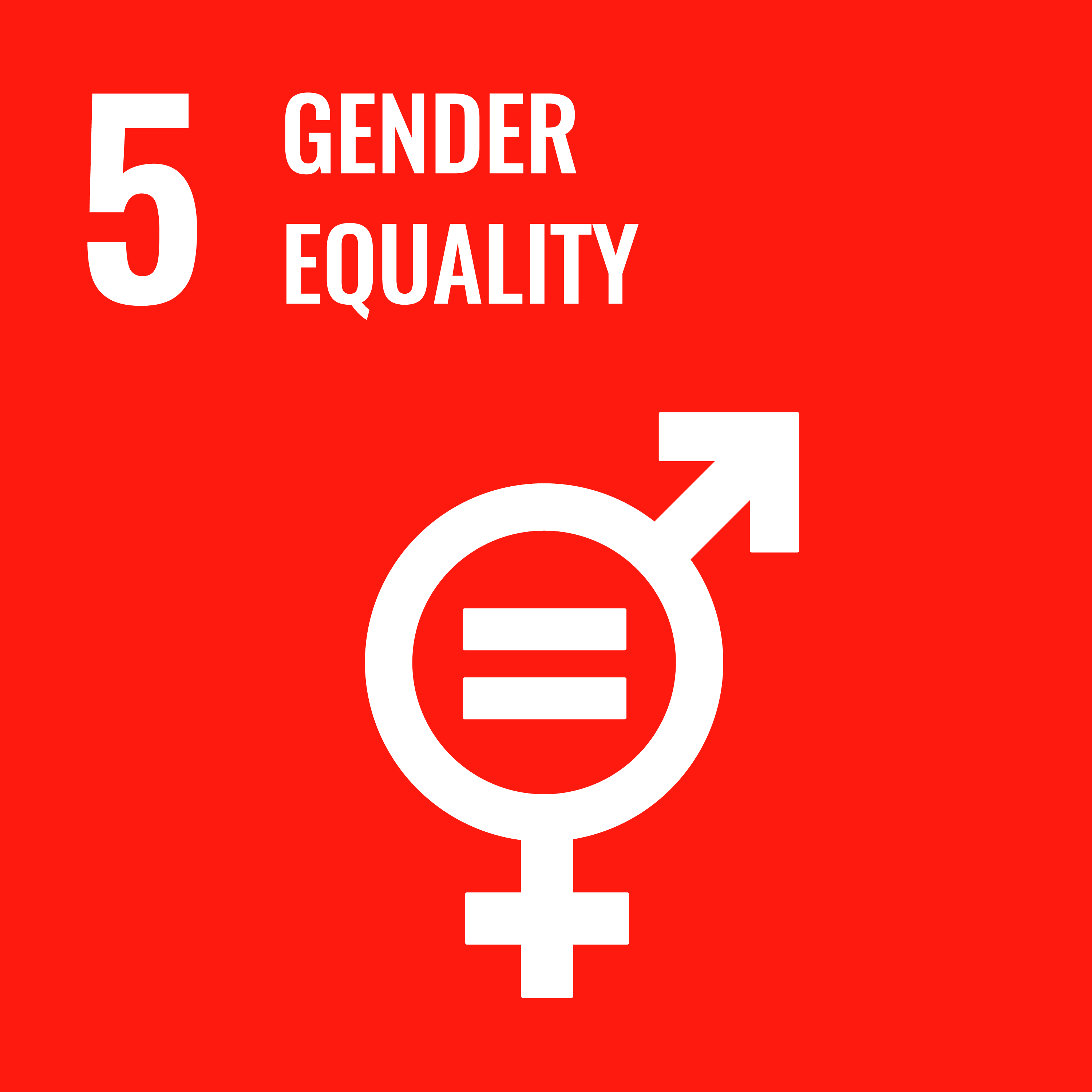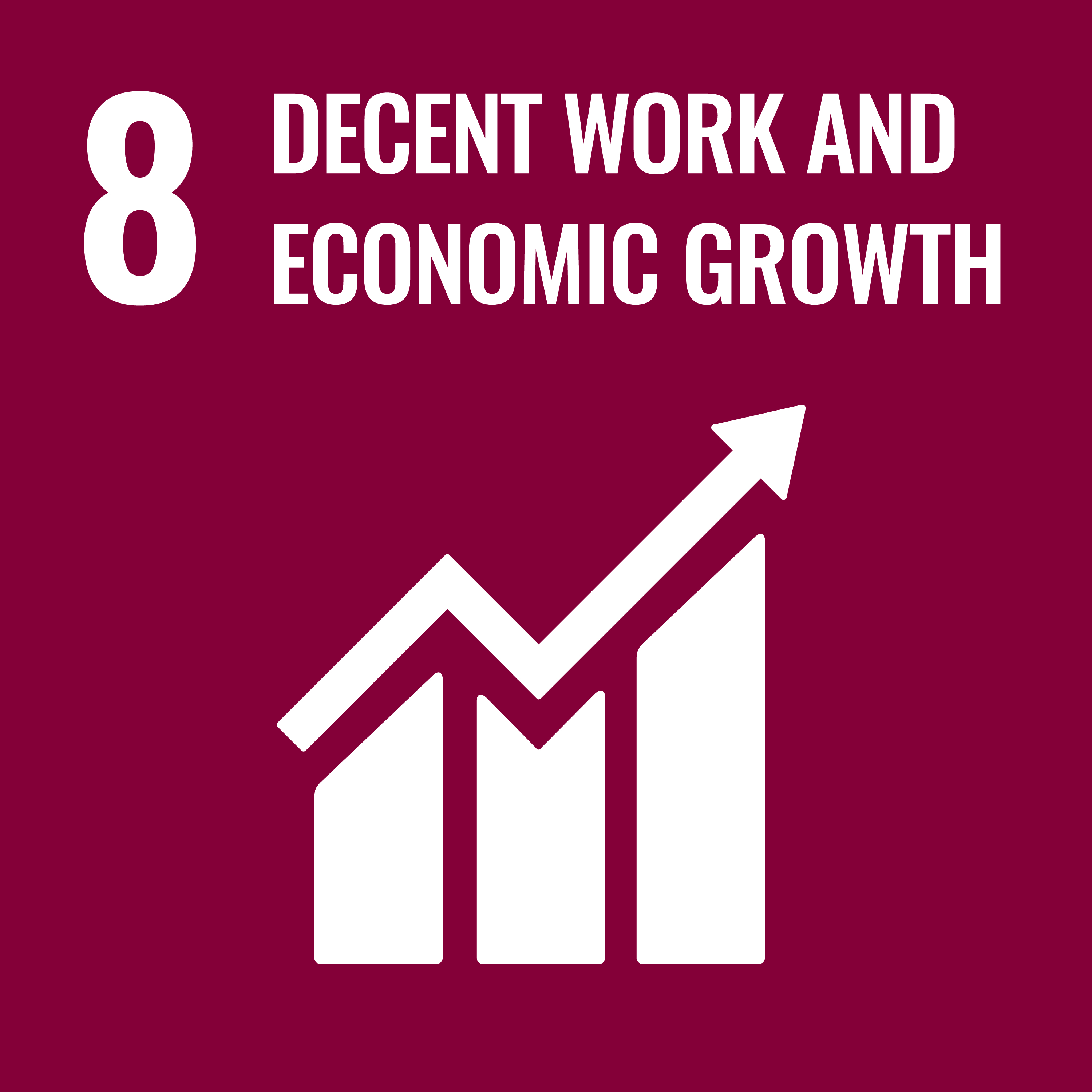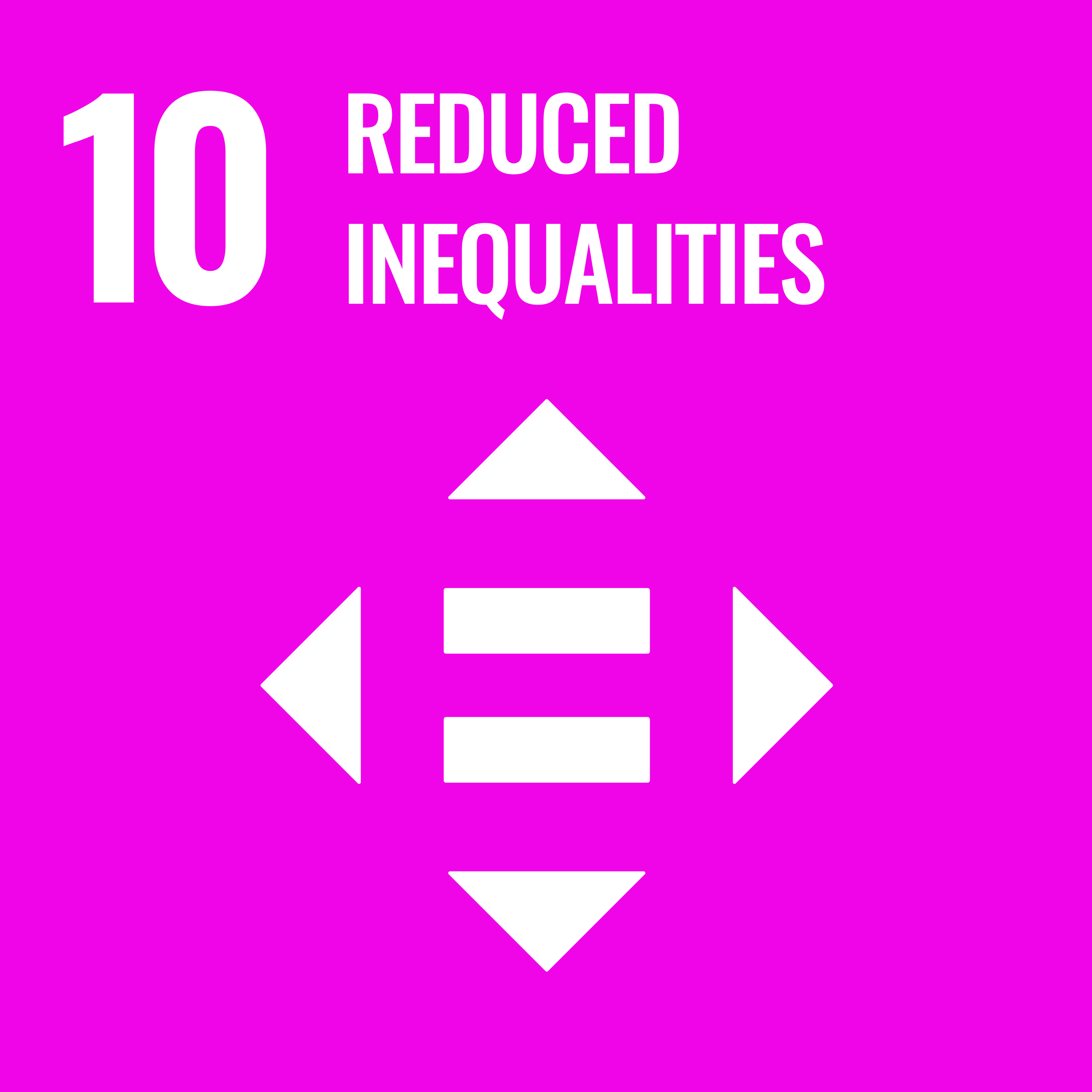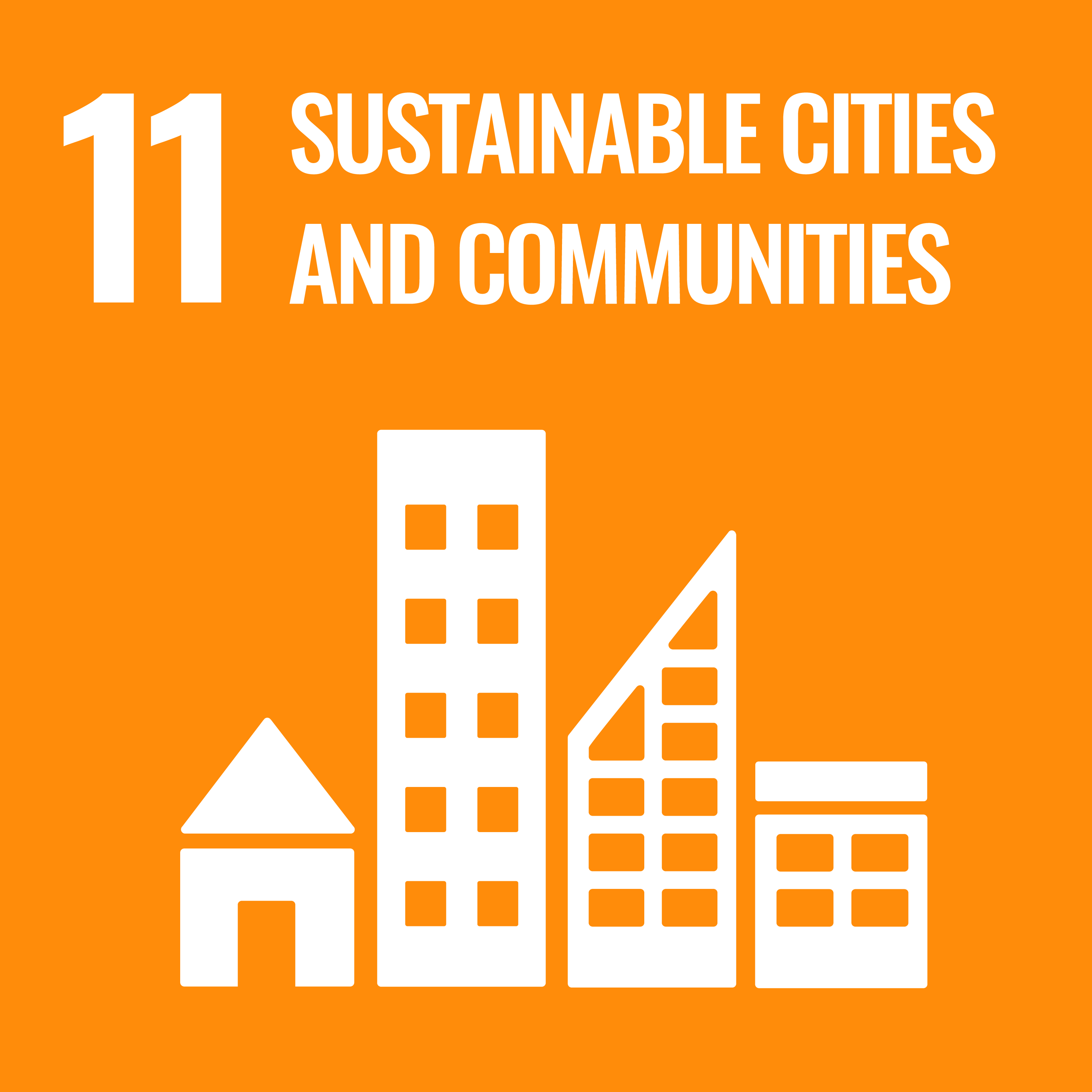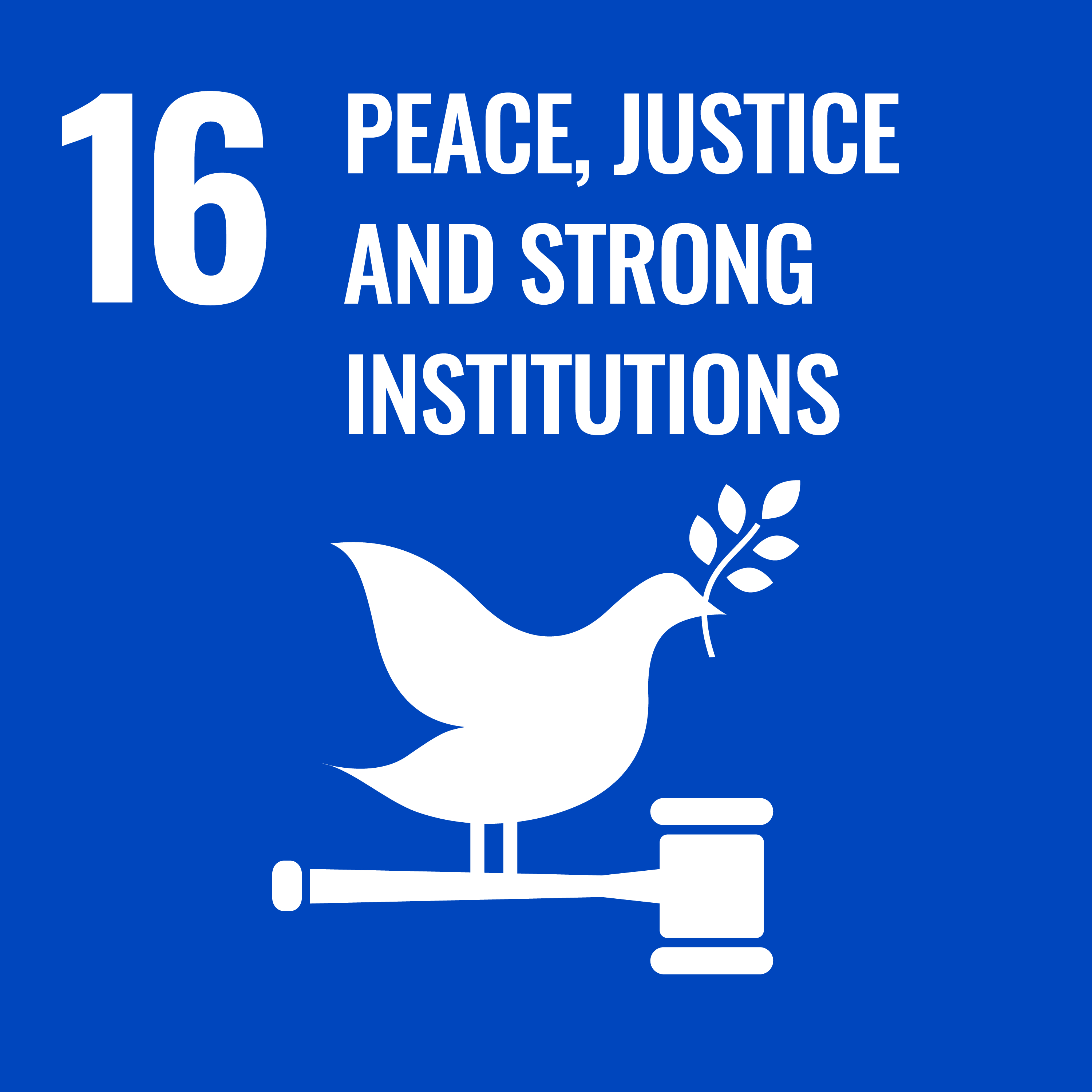Outcome 5: Women’s voice, leadership and agency
More women and girls exercise their voice, agency and leadership, including through an enabling environment that supports women’s and youth organizations.
A scene from community discussions at the massive gathering in Pesantren Annuqqayah – one of the oldest Islamic boarding schools in the country – on how women contribute to peace in their communities. Photo: UN Women/Ryan Brown
Contributes to achieving SDGs
Portrait of Hanna Demydenko. Photo courtesy of Hanna Demydenko
Women have been on the front lines of Russia’s war on Ukraine. Their suffering has been disproportionate and relentless, with women and children making up almost 90 per cent of people fleeing the war. But that is not the whole picture. Women are also humanitarian actors, community leaders, and providers for their families. One in every two businesses in Ukraine is founded by a woman. Ukrainian women are also taking on more roles in traditionally male-dominated professions, such as the security sector, transit, and demining.
Since Russia’s large-scale invasion of Ukraine in 2022, women’s rights organizations and women leaders have been providing humanitarian assistance, advocating for women’s rights, taking on leadership roles in business and in politics, and many have joined the armed forces.
Read the stories of Ukrainian women on the front lines of the war and recovery efforts.
Kseniia Mishyna: The acting village head
Kseniia Mishyna cannot remember when she last ate or slept in calm, had time for relatives, or herself. She heads four villages in the Dniprovks district in Bilozershchina, Ukraine, all severely impacted by the war. She leads and coordinates the safe evacuation of residents, sources essential items, such as fire extinguishers and generators, and oversees the maintenance of electricity and gas networks.
Mishyna is known for her driving skills, navigating hard-to-reach places on the front lines of the war, to deliver food. In areas where basic infrastructure has collapsed, Mishyna delivers essential humanitarian aid.
"I can't imagine myself anywhere else,” says Mishyna, even when she is exhausted. “Managing a team, negotiating, finding money, suppliers, logistics... And suddenly, realizing I did not have a single day of rest.”
Even the resilient need rest, replenishment, and support. Mishyna could access psychological support and learn self-care at a local NGO through a programme supported by UN Women and funded by the United Nations Women’s Peace and Humanitarian Fund (WPHF). Today, she is an active participant in the women’s group, where they create a safe space for one another to share experiences, seek help, and rest.
"You have two hands, one to help yourself, and the second to help others,” says Mishyna. “Only stable and healthy people don’t give up, dream, and help others.”
Community leaders and women’s organizations in Ukraine need urgent and continued support. Over half of the 14.6 million people in need of humanitarian assistance in Ukraine are women and girls. In 2023, the Women, Peace, and Humanitarian Fund, managed by UN Women, distributed USD 10 million to women-led organizations providing humanitarian response in Ukraine, and to support community-led recovery efforts. UN Women is also supporting initiatives to boost women’s livelihoods and participation in decision-making and governance.
Hanna Demydenko: Advocating for rights and social protection for military volunteers
Hanna Demydenko was planning to pursue a career in online marketing, but she became a volunteer military paramedic when Russia launched military aggression against Ukraine in 2014. Her husband joined the Donbas Battalion.
One year on, Hanna, together with a colleague, set up an organization to help volunteers and their families, including the families of volunteers who were killed, get social protection guarantees at the state level.
“Almost no one believed we could succeed, but we kept collecting the necessary documents of those killed and wounded,” said Demydenko. “We prepared and handed over a full package of documents to the families and accompanied them throughout the legal proceedings, to get recognition and benefits.”
In 2019, their work paid off. Draft law No. 2045-1 was passed, and it recognizes military volunteers as combatants, so they can access the social protection measures and state support that military veterans and their families receive.
Demydenko is an activist and works with several organizations, including the Ukrainian Women Veterans Movement, ‘Veteranka’, supported by UN Women, and ‘The Legal Hundred’, a local NGO that provides social and legal protection to veterans and their families.
“The Veteranka Movement remains a place of unity and solidarity for me. With support from UN Women, I work with female veterans to advocate for the rights of women in the army,” said Demydenko. “We also support the rehabilitation of female veterans, so they can come back to accessible homes, stable income, quality medical care, and welcoming communities.”
As of January 2024, according to the Ministry of Defence of Ukraine, nearly 67,000 women were in the Ukrainian Armed Forces[1]. Non-profit organizations like the Veteranka Movement have advocated to change laws, making it possible for women to hold combat positions.
Iryna Klochko: Supporting and speaking out for women in the military
Thousands of women joined the Ukrainian armed forces to defend their country when Russia started its military aggression in 2014, followed by the full-scale invasion on 24 February, 2022. Many were trained as the war unfolded and slipped into uniforms that were made for men, like Iryna Klochko. The 38-year-old intelligence analyst with the Ukrainian air intelligence unit used to be a television director in Kyiv.
“I asked a friend to help me find a job in the army,” recalled Klochko. “There were two options: sniper or decipherer [analyst]. I didn't want to be a sniper. I also didn't know anything about [deciphering codes] … I learned everything from my comrades.”
For seven years before the war, Klochko had worked in television with men who reported to her. Almost overnight, she found herself in a job where men commanded her.
“Most women who join the army struggle with the uniforms,” shared Klochko. “All military clothes and equipment are made for men. You wouldn’t be able to move quietly, because your trousers are so large, they would rustle.”
Even the bulletproof vests are not made to fit women, she added: “When you wear it all day, it hurts.”
Klochko recently joined the Veteranka Movement. As part of its efforts to advocate for the rights of women in the military, Veteranka runs tailoring workshops to design military uniforms for women, free of charge. The organization is also advocating for the introduction of standard uniforms for women in military service. The Ministry of Defense has approved a sample for the summer uniform, but standard winter uniforms for women have yet to be introduced.
UN Women works with more than 40 women’s organizations in Ukraine and has supported over 100,000 women and girls through its programmes. Funding women-led and women’s rights organizations in conflict- and war-affected countries is critical for sustainable peace and development. Yet, globally, such funding is less than one per cent of the Official Development Assistance (ODA). According to OECD DAC data, 90 per cent of bilateral ODA to Ukraine in 2022 did not include any gender equality objectives and only 0.2 per cent of funding was for projects with gender equality as the principal objective[2].
[1] According to data from the Ukrainian Ministry of Defence.
[2] OECD, 2024, Official Development Assistance for gender equality in Ukraine in 2022.
Tags
‘Refugee women’s voices matter’ – Meet Grace Neima Khemis, the first woman Chairperson of her Refugee Welfare Committee
Grace Neima Khemis. Photo: UN Women Uganda
Nearly half of all refugees are women and girls, yet their voices are often absent from decision-making. A UN Women programme in Uganda trains women refugees to lead. On World Refugee Day (20 June), get inspired by the story of Grace Neima Khemis.
It’s 9 a.m. at the Bidi Bidi refugee settlement in Uganda’s Yumbe District, and Grace Neima Khemis' phone is buzzing every five minutes. Callers are mainly village leaders preparing for a meeting taking place later that day. With enthusiasm, Khemis responds to each call.
Khemis, a 34-year-old South Sudanese refugee, was elected in April 2024 as Chairperson of the Refugee Welfare Committee III, the highest leadership role in the committee for the Bidi Bidi Settlement. She is the first woman to be elected to the position, and it wasn’t an easy journey.
Fleeing war and hunger in South Sudan, Khemis arrived in Uganda with nothing more than the clothes on her back and her five children. She embodies the resilience and determination of refugee women who refuse to be defined by their circumstances.
At first, she felt hopeless. "I lost everything I had worked for," she recalls. Back in South Sudan, Khemis was a bank manager, but when conflict erupted in her hometown, she had to flee, leaving behind a promising career and the comforts of her home.
Arriving in Bidi Bidi, the largest refugee settlement in Africa, life was harsh. Yet she persevered, driven by the desire to rebuild her life and help others do the same. That’s when her leadership journey began.
Building leadership skills for refugee women
In 2019, Grace participated in a series of leadership training organized by the Refugee Law Project, as part of a UN Women programme funded by the Government of Norway. The training helped her learn to articulate issues and advocate for change. Khemis then decided to stand for election for the Chairperson’s role in the Refugee Welfare Committee. “I realized that there were more women refugees than men, but we were not in leadership,” she said. “If a woman can lead, why can't we start from our [settlement] zone? I returned from the training determined to compete for the seat.”
Empowered with newfound confidence, Khemis competed against four male candidates for the Chairperson’s seat. Although she didn't win initially, her determination and hard work earned her an important role representing refugees at the national Refugee Engagement Forum. This platform allowed Khemis to amplify the voices of countless refugees. She advocated with decision-makers to address their needs and priorities, such as access to clean water and healthcare referrals. Her dedication resonated with the community, and in April 2024, she was elected as the Chairperson of the Refugee Welfare Committee – the first woman to hold the position.
The majority of refugees in the settlement are women and girls – their voices matter
Khemis understands the unique challenges that refugee women face, having experienced them herself. "Women are the majority," she says, "and a woman leader can empathize with them." Her vision extends beyond her term as the Chairperson – "I want to make sure more women take up leadership roles," she adds.
Khemis knows that boosting refugee women’s leadership cannot be taken for granted. “Even today, there are some women who are afraid to talk in public, some people who think that women are not supposed to talk in public.” In the Bidi Bidi settlement, Khemis says that some roles in education and finance are now reserved for women to encourage their leadership.
Of the 120 million people forced to flee their homes in 2023, 49 per cent were women and girls. In the past year alone, 96,889 refugees arrived in Uganda, increasing the total number of refugees from 1,547,981 to 1,644,870 as of May 2024. The majority of them came from South Sudan and the Democratic Republic of Congo.
“In these protracted crises, it is imperative that services and policies are informed by refugee women's voices and their lived experiences,” says UN Women Country Representative in Uganda, Paulina Chiwangu, adding, “leveraging women’s leadership is not only a way to ensure that humanitarian efforts respond to the gender-specific needs of affected communities, it is also a strategic investment for stronger community engagement, resilience and self-reliance.” In the past five years, UN Women’s work has contributed to more women taking on refugee leadership roles in Bidi Bidi and Adjumani settlements, where women’s representation stands at 47 and 54 per cent, respectively.
Grace Neima Khemis dreams of a future where refugee girls prioritize education, a path she believes unlocks opportunities and leadership roles. Her message on World Refugee Day is clear: “Refugee women’s voices matter.” She urges world leaders to provide more education, leadership and livelihood opportunities for refugee women and girls and to recognize their resilience.
Tags
Timorese women veterans observe the canvases before them—portraits that held not just their faces, but the untold stories of their courage and sacrifices with their pictures and stories. Photo: UN Women Timor-Leste
On a sunlit afternoon at the Resistance Museum in Timor-Leste, a quiet but powerful reunion took place. Several remarkable women, veterans of the Timorese resistance, began to trickle into the exhibition hall. As they entered, their eyes were drawn to the canvases on the walls. There, captured in striking portraits, were their own faces, reminders of the courage they displayed decades ago. They smiled, not just with pride but with the knowledge that their stories, struggles and contribution to the making of a nation, was finally on the walls.
These women were not celebrities, nor were they widely known, but their bravery and dedication are undeniable. They were freedom fighters, the heartbeat of Timor-Leste’s struggle for self-determination. Their gathering was for a special occasion, to witness the women in resistance exhibition, titled “Mátria”, organized by UN Women.
This exhibition, set against the backdrop of Timor-Leste’s long and arduous journey to freedom, was a tribute to the women who fought alongside men, often unnoticed and unsung but always essential. Their stories, hidden in the shadows of history, were now illuminated. One of those voices belongs to Ilda da Conceição, known during the resistance by her nom de guerre: Lalo Imin—which translates to “independence or death, integration never.”
Her portrait shows her in a moment of fierce tenderness—cradling her newborn child in one arm, while holding a weapon in the other as she fled through the jungle. Her life was a delicate balance of motherhood and militancy, a testament to the dual burdens these women often carried.
Another important figure honored in the exhibition is Maria Domingas Fernandes Alves, or "Micato," who championed the cause of women’s political representation and was instrumental in organizing the first Timor-Leste Women’s Congress during the occupation, who later became the Minister of Social Solidarity.
Women like Micato remind us that the fight for freedom was not just on the battlefield, but in diplomatic discussions, in whispers of clandestine meetings, and in the tireless advocacy for women's rights. Their bravery has not only shaped the course of Timorese history but has also left an indelible mark on the global fight for equality.
The “Mátria” exhibition marks the first step in bringing these untold stories to light. It is part of a broader effort that includes a gender-responsive analysis of the Veterans Fund, a coffee table book and a film to capture more of women's contributions, and ongoing support to promote women’s leadership across sectors and in every aspect of conflict prevention and resolution through its second National Action Plan on Women, Peace and Security (WPS).
Recognizing the profound contribution of Timorese women in peacebuilding and sustainable development across generations in their history, Timor-Leste was the third country in South-East Asia to develop a WPS National Action Plan (2016-2020).
Since 2014, the Government of Timor-Leste and participating civil society organizations (CSOs), in partnership with UN Women, developed and implemented the first NAP 1325, to enhance equal, inclusive and meaningful participation and leadership of Timorese women in decision-making and protection from violence, and to strengthen gender-responsive conflict resolution and peacebuilding practices.
The second National Action Plan, spanning five years, was launched earlier this year and serves as a holistic national strategy to ensure that gender equality and women’s leadership is integral to every aspect of conflict prevention and resolution, peacebuilding and post-conflict recovery, and humanitarian response in Timor-Leste.
The “Mátria” exhibition aims to ensure a comprehensive account of the vital roles that women have played in Timor-Leste's development and the promotion of women's rights from 1974 to 2024, while bridging gaps in recognition and representation.
“We’ve undertaken this project to retell history in a more inclusive way, to give voice to stories that have yet to be heard”, said Nishtha Satyam, UN Women Representative in Timor-Leste. “When we tell the story of who won the fight for freedom, if we exclude women, we not only erase them from the past but also from the future.”
Far too often, the contributions of women are not just forgotten—they are never even told. Their stories, their sacrifices, and their resilience are brushed aside, as if their courage existed in the shadows, unnoticed, while the spotlight shone elsewhere.
These women - fighters, diplomats, and activists - deserve recognition as their legacy is etched not just in the history of Timor-Leste, but in the hearts of those who understand that freedom is never a gift—it is won, often through the quiet strength of those who endure in the shadows.
Tags
In the words of: Rafia el Abidi - Libya's first female judge and first female counsellor of the Libyan Supreme Court
Photo of Chancellor Rafia elAbidi in her office. Photo: Rafia elAbidi
In Benghazi, Libya, the story of Chancellor Rafia al-Abidi has become an icon of will and dedication in the service of justice and the promotion of the role of women in society. Her success was born of her determination and dedication to the law, despite the traditional limits imposed on women in the legal profession, she graduated from the Faculty of Law at the University of Benghazi in 1977.
She started her career as a legal researcher in the field of legal affairs management in the Benghazi Legal Department, before becoming a lawyer in the public defender's office and arguing various civil, criminal, and administrative cases. But her real dream was to become a member of the judiciary – seemingly an impossible dream, as the law governing the Libyan judicial system at that time did not allow women to hold the position of judge.
It took until 1989 for her dream to come true, when the Libyan Judiciary Act was amended to open the door to women's participation. Rafia was appointed the first female judge at the Benghazi Court of First Instance, where a new journey began. Over the course of ten years, she faced many challenges, from overcoming stereotypes about women's role in society as well as her own wariness of the paths taken by some litigants. But with patience and professionalism, Rafia has helped change the perception of women and earned everyone's respect and trust.
In 2003, she was appointed as a counsellor for the Benghazi Court of Appeal, before becoming the first female counsellor of the Supreme Court in 2010, and still presides over the Second Criminal Chamber of the Supreme Court.
"The biggest challenge I've faced in my work as a judge,” she now states, “has been people's belief that somehow the role of a judge was reserved exclusively for men."
Rafia is convinced that investing in the promotion and empowerment of women in the judiciary promotes justice and equality in society. The celebration of International Judges' Day is therefore an opportunity to highlight the role of women in the courts and to inspire a new generation of female judges to work hard and impartially.
Thanks to her perseverance, Rafia al-Abidi has gone from being a tenacious lawyer to a trustworthy judge. She climbed the ladder of success to become Libya's first female Supreme Court Councillor, an inspiring role model for women everywhere.
Tags
Interview with Theresia Ngoe: Women’s organizations want to be seen as partners, not only be told what to do
Ms. Theresia Ngoe, Livelihood and Empowerment Officer at the Authentique Memorial Empowerment Foundation, a CERF partner on gender-based violence prevention and response in Cameroon. Photo courtesy of Theresia Ngoe.
Following the aftermath of the recent earthquakes in Türkiye and Syria and the historic drought in the Horn of Africa, international organizations have faced the same criticism: humanitarian response is often too slow in reaching the people who need it most. When it does get to communities, it often fails to adapt to rapidly evolving crisis situations.
In recent years, the international community has realized the importance of local partners who are on the ground, know the needs of their communities, and have the trust and flexibility to effectively deliver humanitarian resources. Yet, local women-led and women’s rights organizations still face significant barriers to participation in the formal humanitarian architecture. Often, they report feeling looked down upon by larger organizations, unheard in decision-making spaces, and forced to defend their expertise. These problems are only compounded for women representing minority or marginalized communities.
In 2021, UN Women and UNFPA received a grant from the Central Emergency Relief Fund (CERF), which earmarked 30 per cent of funds to directly empower local women-led and women’s rights organizations.
UN Women spoke with Ms. Theresia Ngoe, Livelihood and Empowerment Officer at the Authentique Memorial Empowerment Foundation (AMEF), a CERF partner on gender-based violence (GBV) prevention and response in Cameroon, to learn more about the discrimination that local women-led and women’s rights organizations are facing in the humanitarian space and how to tackle the barriers that keep them from accessing funding and resources.
This interview has been edited for length and clarity.
What does it mean to be a women-led or women’s rights organization?
AMEF is a women-led human rights organization headquartered in the Kumba Southwest Region of Cameroon, with additional branches in the Northwest, Centre, and Littoral regions. At least 70 per cent of the board and even the staff are women.
What role did AMEF play in the CERF project on GBV prevention and response?
AMEF raised awareness on GBV and case management, built the capacity of local women’s groups working in prevention and response in the Idenau and Nguti subdivisions, and sought to influence social norms. We witnessed positive changes in the delegation of gender roles within households and in the representation of women in community decision-making bodies such as the traditional councils in Ntale and Mongo Ndoi in the Nguti subdivision. In Idenau, GBV survivors opened up to us about their cases and received support, which enabled them to live safer and more dignified lives.
Why is it important for the international community to work with local women’s organizations?
Local organizations are on the frontlines of humanitarian response. We provided the bulk of the humanitarian assistance on the ground before international organizations even showed up. We often work in the most remote, difficult, and hard-to-reach areas that most outsiders can’t access because we understand the importance of not leaving anyone behind.
We also have a deeper understanding of community needs because we live with these people every day. It’s easier for us to provide them with partner support because, often, they don’t accept strangers.
Often local women’s organizations report facing discrimination in their work with the international community. Have you ever had this experience?
When we work with international partners, we sometimes face discrimination—they don’t listen. They already have an exact idea of what they want to achieve in a specific timeframe. You try to explain why contexts on the ground might influence implementation or the achievement of objectives, but they want to make you accept the project design anyway. The international community needs to work with us as actual partners, not just as implementers who will execute whatever they tell us to do.
You’ve mentioned that the international community can be inflexible in working with local partners. Can you explain?
Local women-led and women’s rights organizations see the reality of what is happening on the ground. If we bring points to the table about improving project design, we want partners to review them, instead of just side-lining us and sticking to the original arrangements. For example, there may be times when the initial budget for transportation is wrong because there are roadblocks due to conflict or crisis, and only a few petrol stations are open, so prices are high. Or maybe staff need to stay in a community because they can’t commute back and forth due to security concerns on the roads. Or there’s no electricity, so laptops and other electronic devices needed for reporting are impossible to use. Sometimes, even when partners know the challenges and security concerns we are facing, they are still too strict, and we don’t feel heard.
Why was the CERF project different in this respect?
Our relationship with UN Women through the CERF project was very positive. First, it improved our capacity to provide psychosocial support and case management services to GBV survivors.
Second, it had a positive impact on our participation in the GBV sub-cluster. For example, when we brought recommendations to cluster meetings about how to close gaps, these were viewed as a great contribution to GBV response planning and were applied by our partners.
In one instance, we noticed that the partner working on livelihood support needed to wait for a different partner to first complete psychosocial assessments with survivors. Because timelines were short, the partner working on livelihood support often couldn’t wait for these referrals in order to meet their implementation deadlines. The UN Women CERF team acknowledged this gap and provided a listening ear for our recommendations, for example, having one partner do both the psychosocial assessments and the livelihood support, or using two partners but making sure that referrals for livelihood support were offered throughout the project’s duration. This made us feel accepted and valued.
How does respect for local partners impact project sustainability?
Unlike the international community, the local partners will always be there. We do not just disappear when the projects are done. For example, in Idenau, we discovered that the children of internally displaced persons can’t go to school because of a lack of financial resources. We already have education programmes up and running, built on the work we were doing through the CERF project. So, if you truly work with local partners, they’ll sustain support, which will have a long-term benefit for the people we are serving.
About the CERF Global Grant for Gender-based Violence Prevention and Response
Central Emergency Response Fund (CERF) is a United Nations emergency facility established in 2005 to enable humanitarian responders to deliver life-saving assistance whenever and wherever crises strike. In 2021, UN Women and the United Nations Population Fund (UNFPA) were allocated USD 25 million by the CERF Global Grant to strengthen the response to and prevention of gender-based violence in emergencies.
Tags
In the biggest electoral year in history, 113 countries have never had a woman Head of State, new UN Women data shows
More people than ever will go to polls in 2024, when 113 countries have never had a woman at the helm, and only 26 countries are led by a woman today.
New York – Globally, women’s underrepresentation in decision-making remains as a stark reality, according to UN Women’s global data on Women Political Leaders 2024. UN Women’s new data on gender parity across leadership positions is published as the world commemorates the International Day for Women in Diplomacy on June 24.
Despite progress, women are still largely excluded from positions of power and diplomacy, with the highest levels of influence and decision-making still predominantly occupied by men. A staggering 113 countries worldwide have never had a woman serve as Head of State or Government and only 26 countries are led by a woman as of today. As of 1 January 2024, only 23 per cent of Ministerial positions are held by women and in 141 countries women make up less than a third of Cabinet ministers. Seven countries have no women represented in their Cabinets at all.
Male dominance in diplomacy and foreign affairs extends to the Permanent Missions to the UN, where women remain underrepresented as Permanent Representatives. As of May 2024, women held 25 per cent of Permanent Representative posts in New York, 35 per cent in Geneva, and 33.5 per cent in Vienna.
UN Women Executive Director Sima Bahous, said, “Our work is guided by the belief that when women lead, the world is better for all people and the planet. As many countries head to the polls this year, we all must put women first, at the pinnacle of power, where and when it matters the most. Women’s equal participation in governance and leadership is key to improving lives for all.”
Electing and appointing women in leadership positions signals strong political will for gender equality and demonstrates a collective commitment to tackling the challenges the world faces today. As we prepare to mark 30 years since the passage of the Beijing Declaration and Platform for Action, the world’s most progressive blueprint for advancing women's rights, UN Women continues to work to ensure women lead and thrive in shaping and driving positive change, including through occupying the most senior positions of power.
Tags
Yuli Velázquez is an environmental defender working with the fishing communities of Santander, in northern Colombia. She is speaking at an event that brought together women fishers from different parts of Colombia. Photo courtesy of CREDHOS
As temperatures reach new highs and climate change impacts intensify, women who are defending their land, water and ecosystems are paying a high price.
“I have suffered three attempts on my life because of my work as an environmental defender,” said Yuli Velázquez, who works with the fishing communities of Santander, in northern Colombia.
“We protested against irregularities in a contract to clean up the San Silvestre swamp, for which a hydrocarbon company gave 5 billion pesos,” explained Velázquez, who is the president of the Federation of Artisanal, Environmental and Tourist Fisherfolk of the Department of Santander (FEDEPESAN).
Velázquez lives in Barrancabermeja, less than a kilometer from the San Silvestre swamp, where she grew up fishing. She and others in the community fish in the marshes and the rivers nearby. They want the local authorities to test the water and sludge for contamination.
“We catch less fish now,” said Velázquez. “This year we have seen animals, even cows and buffalos, fish and birds dying. The West Indian manatees are on the way to extinction, we have proof of all of this.”
Velázquez started fishing when she was five years old, with her mother and grandparents.
“Before the attacks, we used to go fishing every day at night, because that was the best time to fish,” she shared. Now, she goes fishing three times a week, and only during the day. The risks are too high.
In 2020, Velázquez experienced the first attack in her home. Other women in the community have also been threatened and attacked, often in front of their children.
In June 2024, Velázquez received the Amnesty International Germany’s Human Rights Award on behalf of FEDEPESAN, bringing them international recognition. Since then, FEDEPESAN has filed a public lawsuit against the hydrocarbon company for polluting the water and endangering the ecosystem.
The threats to Velázquez’s life have continued, and she cannot move around without a bulletproof vest, an armored vehicle, and security officials.
Climate change and environmental defenders
Climate change impacts lives, culture and livelihoods of millions of women and their communities. By 2050, climate change may push up to 158 million more women and girls into poverty.
Yet, women human rights defenders, grassroots feminist groups and indigenous women are routinely sidelined in climate negotiations and decision-making. When they defend their environment, they face bullying, harassment, and violence.
A new report by Global Witness shows that an estimated 196 land and environmental defenders were killed in 2023, and for the second year running, Colombia ranked as the most dangerous place for environmental defenders, with a record 79 killed.
For the nearly 100 fisherwomen who are members of FEDEPESAN, fishing is a way of life, livelihood, and food security. To mitigate the rising risks because of their activism, they frequently change their schedule and routes for fishing and water monitoring.
“Fishing for us means preserving the ancestral [heritage], what our grandparents taught us. They used to say, "If we live next to the swamp, we have food,” explained Velázquez. “With fishing we have a guaranteed job, and in my case, I have been able to give my children an education. Also, this work allows us to take care of the environment.”
Fishing ensures food security for the families in this area. After keeping some fish for household consumption, the women trade the rest for income and other food items.
Biodiversity, conservation, and the role of women
Velázquez and other women in the community teach the next generations how to care for the environment. When they saw garbage being thrown in the river and the swamp, they started raising awareness in the communities near the river about composting and safer ways of waste disposal. They clean the swamp three times a year.
“My grandmother taught me since I was a child to take care of the Magdalena River,” explained Velázquez. “She told me that if we take care of the river, we will have food, so we should not throw garbage, trammel nets, or (over)fish. If I go fishing and catch just enough, I go home, I don't overfish.”
Velázquez also teaches her children about gender equality: “I have a son and a daughter, and from a very early age, I taught them that housework is everyone's responsibility and that activities like fishing can be done equally by men and women."
The artisanal fishing sector has a lot of entrenched sexism, and FEDEPESAN works with men and women to improve their understanding of gender issues. “We have managed to reduce violence against women, because they receive education and training to be aware that violence in the home is not normal. Men have also started to appreciate our work. They know that we can be as good or better than them in fishing,” she shared.
How UN Women works with environmental defenders
Yuli Velázquez is part of a new UN Women programme, Mujeres cambiando su mundo (Women changing their world), funded by the Government of Germany and implemented in partnership with the Government of Colombia. Starting in Cauca and Magdalena Medio this year, the programme recognizes the work of women environmental defenders and creates a safe and enabling environment for their advocacy and protects their livelihoods. It is also working with national and local authorities to improve protection of the rights of women environmental leaders and defenders and to facilitate their participation in decision-making.
For UN Women, the programme is critical for lasting peace in Colombia. “The climate crisis fuels conflict, social unrest, and migration. The women environmental and human rights defenders are leaders on the front line of this crisis,” said Bibiana Aído, UN Women Representative in Colombia. “The local knowledge, lived experience, and leadership that these leaders bring must be at the centre of all decisions made at local, national and regional levels for protecting the environment and maintaining peace.”
The programme has sparked hope for Velázquez, who dreams of living in peace with nature: “My dream as a woman and an environmentalist is to be able to show my grandchildren the places we have fought so hard for: to show them the manatees and monkeys I have cared for.”
From 21 October to 1 November, the UN Convention on Biological Diversity (UNCBD) COP16 will take place in Cali, Colombia, where UN Women will organize a side event titled, 'Defending the women who defend the planet’. The event will highlight the important role of women environmental human rights defenders like Yuli Velázquez who dedicate their lives to defending their land and protecting biodiversity.


